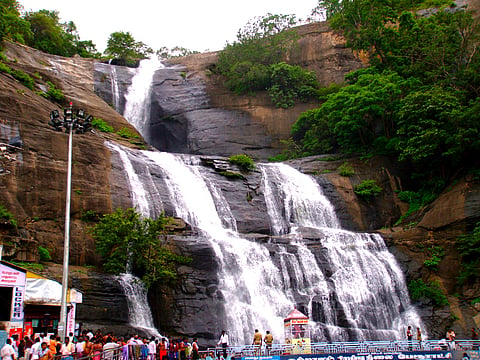
- Destinations
- Experiences
- Stay
- What's new
- Editor’s Picks
- Responsible Tourism
- CampaignsCampaigns
- Subscribe

Heavy rain in the Western Ghats has restricted tourism at waterbodies near the Old Courtallam Falls, Tamil Nadu. Situated in Tenkasi, Old Courtallam Falls recently experienced flash floods. Authorities prohibited bathing near the falls to prevent any untoward incident. Despite the favourable weather, the water level downstream of the falls has not receded.
Tamil Nadu experienced unusual rainfall this year. Initially, Cyclone Michaung brought substantial rains to Chennai and surrounding districts, causing destruction. Recently, the southern districts of Tamil Nadu encountered significant rainfall. Due to the rains, the state has suffered significant public and private property losses, amounting to crores. Tamil Nadu Chief Minister MK Stalin has requested INR 12,000 crore in central assistance and INR 7,300 crore for immediate relief for the damages in the flood.
Courtallam is known for its famous waterfalls. These falls, including Main Falls, Small Falls (Citharuvi), Five Falls (Iyentharuvi), Tiger Falls (Puliyaruvi), Old Courtallam Falls (Palaiya Courtallam), SenbahaDevi Falls (Senbakadavi), and Honey Falls (Theanaruvi), are valued for their potential medicinal properties as they flow through forests and herbs. Referred to as the 'Spa' of South India, Courtallam holds significance as a natural destination with multiple distinct waterfalls.
Peraruvi, the largest falls in Courtallam, stands at about 60m high. The water flow is interrupted by Pongumakadal, a 19m deep crater, resulting in a bath with significantly reduced impact, ensuring safety. Chitraruvi, with a thin flow, has naturally separate bathing areas for men and women. Shenbagadevi Falls follows, where water flows through shenbaga (Michaelia champak) trees, accompanied by a temple dedicated to Shenbagadevi Amman.
Shenbagadevi leads to Chitraruvi. Thenaruvi, about 3 km away, is 40m high and cascades between two large stones. It is known for being dangerous and restricted to the public, although it is expected to observe people visiting and bathing there. Aintharuvi, with five separate cascades, includes Pazhathotta Aruvi, also known as the 'VIP Falls,' flowing from the orchard above. Access to Pazhathotta Aruvi is exclusively available to VIPs.
